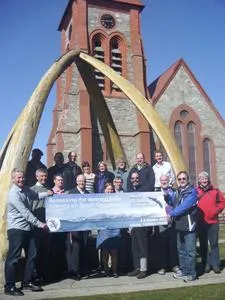
To assess how the scientific requirements of South Georgia will best be facilitated, a NOC scientist joined others from institutes around the world in the Falklands this week.
Professor Richard Sanders, from the NOC said “This meeting was an excellent opportunity to be part of a global collaboration of scientists aiming to improve our understanding of this under-studied and important part of the world. The area around South Georgia is home to most concentrated phytoplankton bloom in the Southern Ocean, which absorbs atmospheric CO2 as well as forming the base of the food web, feeding krill.”
The South Atlantic Environmental Research Institute (SAERI) have hosted the visit while it was privately funded by the Mamont Foundation which was established in 2007 to fund the exploration of the Polar Regions in order to better understand the earth.